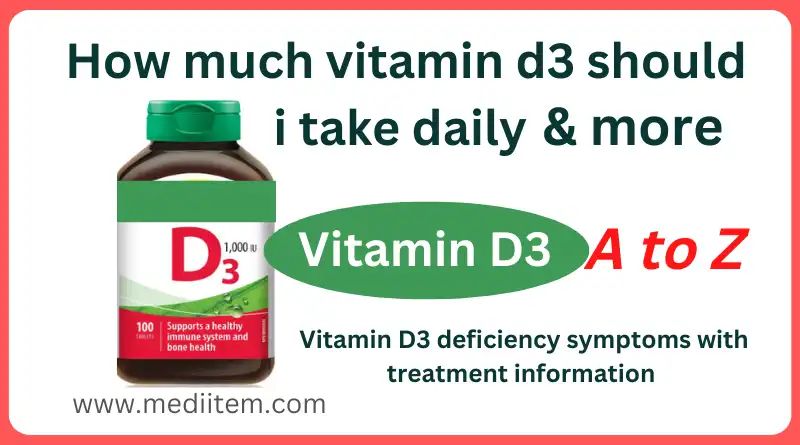How much vitamin d3 should i take daily?
How much vitamin d3 should i take daily, main properties of the best-known function of vitamin D is that it helps the body absorb calcium, one of the main elements of bones and teeth.
Helps to have strong bones: it promotes the absorption of calcium in the intestine, which contributes to the normal mineralization of bones and has an impact on the reduction of fractures. Calcium, which is so good for our bones, couldn’t do its job without vitamin D.
The difference between vitamin D and vitamin d3 (ergocalciferol) can be obtained from food, however, this source is usually insufficient, since not all foods contain this vitamin.
Vitamin D3 or D2 is converted in the liver into 25 hydroxy-vitamin D, and at the kidney level, it is converted into its active form: 1.25 dihydroxy. Very few foods contain this vitamin naturally. Foods fortified with added vitamin D provide the majority of this vitamin in diets. Fatty fish, such as salmon, tuna, and mackerel are among the best sources of vitamin D. Beef liver, cheese, and egg yolk contain lesser amounts.
Mushrooms provide a certain amount of vitamin D. In certain types of mushrooms that are now on the market, the content of vitamin D is increased by exposing them to ultraviolet light. Almost all milk is fortified with 400 IU per liter. However, milk-based foods, such as cheese and ice cream, are generally not fortified, certain breakfast cereals and some brands of orange juice, yogurt, margarine, and soy-based beverages are added. Always check the labels.
Comparison between: The study gathered a total of 75,454 participants, and the most outstanding results were the following:
*Vitamin D supplementation overall does not significantly reduce all-cause mortality (hazard ratio 0.98, 95% confidence interval – 0.95 to 1.02), except when separated into subgroups of vitamin D3 and vitamin D3 supplementation D.
*All-cause mortality was significantly lower in trials using vitamin D 3 than in trials using.
* supplementation was associated with a significant reduction in cancer mortality by 16% (hazard ratio 0.84, 95% confidence interval -0.74 to 0.95).
*Meta-regression analysis found that all-cause mortality is significantly lower when supplementation trials have longer follow-ups.
The results of the present study suggest that the use of supplements reduces cancer mortality by 16%. However, it does not reduce mortality from cardiovascular disease, cerebrovascular disease, or ischemic heart disease. These results differ from two previous systematic reviews. A 2014 Cochrane review found that the use of supplementation decreased all-cause mortality in an analysis of 56 trials with a total of 95,286 participants. Another systematic review that included 40 trials with a total of 81,173 participants also showed a reduction in mortality. The cancer mortality results are consistent with the results of a previous meta-analysis, also published in the BMJ.
Which form is better:- There are two forms: vitamin D3 (calciferol), which is what our body produces when exposed to sunlight, and vitamin D (ergosterol), obtained from food. Both are safe for the body.
However, research shows that vitamin D3 is more effective than achieving adequate values. Ultimately, it doesn’t matter what form of vitamin D3 you take, whether it’s in a capsule, tablet, or liquid form. In most people, vitamin D is easily absorbed by the body, and it does not matter what time of day it is or whether it is taken with food.
How much vitamin d3 should i take daily for children
Summary: *Children 1 to 13 years old: 15 mcg (600 IU)
*Adolescents 14 to 18 years old: 15 mcg (600 IU)
*Infants up to 12 months: 10 mcg (400 IU).
Vitamin D promotes bone health: It helps ensure that the body absorbs and retains calcium and phosphorus, both critical for bone development and preventing rickets.
Rickets is a bone-softening disease that can affect children, especially in the first two years of life. it deficiency also increases the risk of bone fractures in older children, adolescents, and adults. also plays a role in the immune system response and has been linked to mental health. Research suggests that people with vitamin D deficiency may be at increased risk of depression.
All children need it shortly after birth. the (AAP) currently recommends that- currently recommends that:
*Babies under 12 months of age need 400 IU daily.
*Young children, older children, and adolescents need 600 IU per day.
For breastfed or bottle-fed babies: Liquid supplements are the best option. There are liquid preparations that provide the recommended intake of 400 IU in ½ or 1 ml. There are also liquid solutions in drops, which provide one drop that is equal to 400 IU per day. As with all medications and supplements, vitamin D supplements should be kept out of the reach of children.
Helps prevent childhood diseases: a correct level of vitamin D contributes to the prevention of diseases such as childhood rickets, which cause weakening and deformation of the bones. In addition, it plays an essential role in the functioning of the nervous and muscular systems.
Why should babies be given vitamin D
This question is perhaps the most asked by first-time parents, however, those who are already having their second child may be wondering: “Why is vitamin D intake recommended for babies now when at the stage of my first child no one recommended it?
The answer to this is simple: before it was believed that it was enough to take our baby outside and let the sun shine on him. They were partly right, the sun is the greatest source of vitamin D that we can obtain, however, it has been shown that we need more of said vitamins.
How much vitamin d3 should i take daily for the sun my baby: After several studies, the following has been concluded:
**In summer, 7 minutes of sun a day will be needed.
**In winter, about 35-45 minutes three times a week is needed.
Everything is so variable that in most cases there is a lack of vitamin D. The established recommendation is as follows:
***Premature infants less than 12 months of age should take 200 IU/day up to a maximum of 400 IU/day.
***Breastfed babies less than 12 months old should receive a supplement of 400 IU/day.
*Babies taking formula should continue with the previous dose unless they consume 1 liter daily of milk fortified with vitamin D.
In short, as you may have read, the ideal thing for you and your baby is to go outside, sunbathe a little, and complement it with a good vitamin D supplement.
Vitamin D3 deficiency symptoms with treatment information
Despite having a favorable climate for the cutaneous synthesis of vitamin D, the levels of this vitamin are similar to or even lower than those described in central Europe or Nordic countries. This could be explained, in part, by the low dietary intake of vitamin D, which is not compensated by skin synthesis. It is them that in some conditions, different scientific societies recommend supplementing vitamin D deficiency.
Despite this, the public health measures recommended by different scientific societies are:
*Do not prescribe vitamin D supplements in the general population, since treating asymptomatic subjects without belonging to risk groups has not been shown to improve health
*Patients with gastrointestinal malabsorption (due to bariatric surgery, inflammatory bowel disease, gluten intolerance, or lactose intolerance, among others)
*Pregnant women, since maternal vitamin D deficiency is a risk factor for childhood rickets (it is more common in immigrants with dark pigmentation)
*Subjects with little or no sun exposure for cultural reasons, by medical prescription (patients with cancer or certain skin diseases), or others
*Patients with darker complexions (Africans, Central Americans, and Southeast Asian individuals)
*Supplement only high-risk population groups, which are: Institutionalized and/or elderly patients living in nursing homes Patients at high risk of falls, osteoporosis, and/or fragility fractures Patients with prolonged immobilization
*Exclusively breastfed infants under 1 year of age and all children between 1 and 4 years of age.
*Breastfeeding infants: Human milk alone may not meet infants’ vitamin D needs. The American Academy of Pediatrics recommends that fully or partially breastfed infants receive 400 IU per day in vitamin D supplementation beginning in the first days of life. They will be taken in liquid format.
*People with black skin: upper rate of melanin, the pigment that gives skin its paint, shortens the amount created from sunlight.
Therefore, people with darker skin often have lower levels of vitamin D. In fact, black Americans have a rate of vitamin D deficiency 15 to 20 times higher than white Americans.
*People with certain digestive conditions: If you have a health condition that affects your ability to digest fats, such as Crohn’s disease, ulcerative colitis, or celiac disease, you may not be able to imbibe enough to meet the (RDA).
*Older adults: The body’s ability to make vitamin D from sunlight decreases with age. Additionally, adults who expend more time indoors are also at higher hazard for deficiency.
Supplementation with 1,000 to 2,000 IU per day is generally safe for adults and can help raise vitamin D to levels recommended by health authorities.
Also, it is important to combine vitamin D supplements with dietary fat because fat increases the absorption of vitamin D, which is fat-soluble. For example, you can take your supplement with a meal that includes oil, nuts, avocado, or fatty fish.
It’s important to talk to a healthcare professional before trying vitamin D or D3 supplements, as they’ll want to check your levels beforehand, says Jen Hernandez, registered dietitian and founder of Plant-Powered Kidneys.
Your doctor can provide further guidance on how to increase your intake of vitamin D3
Vitamin d deficiency and neurological symptoms
- Among children, low vitamin D levels are significantly associated with the likelihood of Attention Deficit Hyperactivity Disorder, and lower-than-recommended concentrations in the perinatal period are associated with an increased risk of ADHD in adulthood.
- Vitamin D has been widely discussed in closely related areas, such as nutrition and endocrinology, and more recently, it has gained space in other specialties, such as neurology, given the importance of this nutrient (or hormone, also much discussed) today.
- In a very interesting systematic review and meta-analysis published by Advances in Nutrition this year, researchers evaluated the relationship between vitamin D and attention deficit hyperactivity disorder. The work included the analysis of 13 observational studies (9 of them case-control or cross-sectional studies and 4 prospective studies).
- Results obtained from case-control or cross-sectional studies showed that children with ADHD have lower serum concentrations of 25-hydroxyvitamin D than healthy children. The authors point out that this result, although clinically statistically significant, the difference (of 6.93 ng/mL), may not be of great importance, and it is always up to the professional who works in clinical practice to make these considerations. The results of the meta-analysis of these 5 case-control studies revealed that a low level of vitamin D is significantly associated with the likelihood of ADHD.
- The meta-analysis of prospective studies showed that suboptimal concentrations in the perinatal period are associated with a higher risk of ADHD in later life, but of course, these results must be understood with caution and without a causal relationship. -It is made.
- Many review studies have already mentioned vitamin D deficiency as a risk factor for diseases of the central nervous system, however, those specifically ADHD are still scarce. In this sense, this work brings important results of great scientific weight given the analysis carried out, thus opening new paths and discussions both in the area of nutrition and neuroscience.
- How much vitamin d3 should I take for cognitive disorders – is important for brain plasticity, to the point that its deficiency can be a determining factor in the development of cognitive disorders, including depression and schizophrenia. This is indicated by recent studies carried out by the Queensland Brain Institute, belonging to the University of Queensland (Australia). In addition, a test carried out in mice and a study of the human brain developed by this same university showed deficiency as a risk factor for cognitive decline and dementia.
- Vitamin D deficiency can be a determining factor in the development of cognitive disorders, including depression and schizophrenia
- As early as 2015, the International Society for Nutritional Psychiatry Research (ISNPR) noted in a consensus document that epidemiological data, research, and clinical evidence “suggest that diet influences both the risk and outcomes of mental disorders ”. Its members advocated nutritional changes and the prescription of nutraceuticals as a means of improving mental health. Among those nutrients that have a “clear link” with mental health, the ISNPR included vitamin D.
- According to professor and researcher at the Queensland Brain Institute, Thomas Burne participates in the regulation of genes important for brain function and “acts as a neurosteroid”. As such, it influences brain processes that affect mood and behavior.
- **participates in the regulation of genes important for brain function and “acts as a neurosteroid”
- Last February, the research team led by Dr. Burne published two studies in the journals Brain Structure and Function and Trends in Neuroscience, on the reasons that make such an important nutrient for brain plasticity and how its deficiency can influence cognitive disorders.
- Until now, it was not known exactly how vitamin D influences the structure and function of the brain. The Queensland Brain Institute carried out a study in mice that produced evidence that vitamin D levels influence neural networks (PNN). These networks participate in cognition and memory functions. Furthermore, they protect neurons from oxidative stress and neurotoxins and stabilize the contacts these cells make with other neurons.
How much vitamin d3 should i take for Adults
Summary: *Adults 19 to 70 years: 15 mcg (600 IU) *Adults over 71 years: 20 mcg (800 IU).
-Some studies affirm that the daily intake should be higher if there is not enough sun exposure or if we have a dark skin tone. Let us remember that these recommended daily amounts should not all be achieved through diet, but that food will account for between 15 and 20% and the rest is obtained from sunlight.
The recommended daily upper limit of vitamin D is 1,000 IU for those under 18 years of age and 4,000 IU for adults. A vitamin D deficiency can be found by performing a simple blood test. If the results show a deficiency, it could mean that:
*Not enough sun exposure
*Not enough vitamin D is being included in the diet
*The body has difficulty absorbing this vitamin We recommend, in case of doubt, consulting a specialist in each specific case.
Vitamin D: is a fat-soluble vitamin that is found in various natural food sources, as well as being absorbed by the skin after exposure to sunlight. It is also called calciferol and is essential for the formation of bones and teeth since without it we would not be able to absorb calcium at the intestinal level. In recent years, vitamin D has been used in combination with calcium to improve bone health and reduce the risk of fractures.
In this sense, an adequate level of vitamin D is related to the prevention of high blood pressure, various types of cancer, and other diseases. More recent research also points to a possible link between vitamin D deficiency and chronic pain.
At present, a growing interest in vitamin D has been generated; not only for its fundamental role in bone and muscle maintenance but also for its contribution to the proper functioning of the immune system. In addition, during the confinement caused by the coronavirus pandemic, there has been greater concern about the lack of vitamin D, since the exposure to the sun has been much less.
What are the main functions of vitamin D
Active vitamin D helps increase the amount of calcium that the intestine can absorb from ingested food into the bloodstream and also prevents calcium loss in the kidneys. Vitamin D modifies the activity of bone cells and is important for the formation of new bones in children and adults.
Therefore its deficit is related to:
Osteomalacia (adults): Higher doses of vitamin D may help prevent osteoporosis, falls, and fractures in older adults.
Rickets (children): Vitamin D deficiency in children is characterized by growth retardation and soft, weak, and misshapen long bones that bend and arch under their weight when children begin to walk.
Additionally, vitamin D deficiency has been linked to several health benefits, pointing to a wide range of functions in which it may be involved. However, the studies that inform us of the benefits of vitamin D still have to be interpreted with caution, since the benefits are not fully proven. For example, it has an important role in the prevention of different diseases, such as:
*Chronic pain: In different studies, it has been seen that vitamin D deficiency could be related to chronic pain.
*Prevention of infections: Some studies have linked vitamin D deficiency with a more serious picture due to respiratory infections and even COVID-19, due to the role it has in the proper functioning of the immune system.
*Metabolic diseases: Plays an indirect but important role in carbohydrate and lipid metabolism, as reflected in its association with type 2 diabetes, metabolic syndrome, insulin secretion, insulin resistance, polycystic ovary syndrome, and obesity.
*Cardiovascular risk: This includes endothelial cell dysfunction, thereby accelerating the process of atherosclerosis, hypertension, or abnormal coagulation, ultimately leading to an increased risk of all cardiovascular events.
*Dementia: Vitamin D deficiency increases the risk of developing dementia.
*Cancer prevention: Vitamin D may help prevent cancer. One study found that 1,100 IU a day, along with calcium, reduced the risk of cancer in a significant percentage of patients.
Vitamin d deficiency causes disease
There are many diseases that an adequate intake of vitamin D will help you prevent.
- Osteoporosis
- Fights off infections
- Autoimmune diseases
- intellectual performance
- colds
- functioning of cell division
- Reduces inflammation in the body
- Bone diseases (including rickets)
- Bone and back pain
- Depression
- OB/ GYN
- Cancer
- Diabetes (Read more: What is a dangerous level of blood sugar with natural tips)
- Cardiovascular diseases
- Hypertension
- Chronic inflammation
- Immune system disorders
- Endogenous
- healthy and restful sleep
- Neurological diseases
- Muscular weakness
- Psoriasis (Read more: How to cure psoriasis permanently with homeopathy)
- Strengthens teeth
- Rheumatoid arthritis
- Alzheimer’s
- strengthens the bones
- Contributes to hormonal balance
- Controls the absorption of calcium in the intestine.
Read more: For what is vitamin D most important
Protects against colds
A low level of vitamin D increases the risk of colds and respiratory tract diseases by 40%.
We are not saying this, but rather it is confirmed by the evaluation of some 19,000 people who, on average, had vitamin 25 (OH) with vitamin D values between 10 and 29 ng/ml. In patients with asthma, this relationship is even more accentuated, although a direct relationship has not yet been demonstrated. However, its incidence in preventing colds has been demonstrated.
Reduces the risk of diabetes
Vitamin D protects the insulin-producing cells of the pancreas while increasing insulin sensitivity, helping sugar to be transported to the cells much more quickly through the blood.
In general, we can say that it reduces the risk of developing diabetes. Promotes intellectual performance
Do you need to concentrate better or be faster to process information? Then team up with vitamin D supplements, since it has been shown that those with high levels of it achieve significant results in terms of their intellectual performance.
Protects against other diseases such as cancer
We have already alluded to the fact that the substance in question acts as an effective protective shield. Along these lines, it is capable of regulating various genetic functions that help reduce cancer cell proliferation.
This means that people with high levels of vitamin D reduce their chances of contracting certain types of cancer, such as colon or breast, by up to 40-50%. the ability of vitamin D to counteract the degeneration of cells and, therefore, prevent the formation of tumors. Even low levels of vitamin D (400 IU) are capable of reducing the risk of breast cancer by up to 24%. Surely vitamin D plays a role in many more biological processes that are still unknown.
To date, scientific and epidemiological studies are lacking to be able to consolidate the information from initial studies and establish all the postulated benefits of vitamin D.
How much vitamin d3 should i take pregnant
*Pregnant or lactate wife & young: 15 mcg (600 IU)
According to the National Institute of Health of the United States (NIH), the recommended daily amount of vitamin D is between 400 to 800 IU and varies according to age. Finally, and as we do with any other patient in rheumatology, it is very important to take into account all the available evidence to make decisions for that specific patient, but we must also individualize each case to find the best possible decision.
The relationship between vitamin D and calcium is worthy of being “framed”. Not surprisingly, the first is responsible for ensuring that calcium is absorbed through the intestine. Together with vitamin K2, it plays a crucial role in bone metabolism, mainly in the construction of bone mass and in the maintenance of a firm bone structure. Its deficiency in the body increases the risk of osteoporosis and bone fractures, so if you want to avoid it, vitamin D supplements can do a lot for you. Read more: Which vitamin D supplement is best
New recommended product
1) Nature Made Vitamin D3 2000 IU (50 mcg) for Bone, Teeth, Muscle, and Immune Health Support,…
2) Biophix Organic Vitamin D-3 K2 Turmeric 180 Vcaps…
Please subscribe to my channel and follow
YouTube



